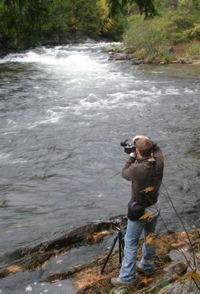
Many copy editors at a session I attended were clueless as to how programs such as iGoogle gather headlines through RSS, or really simple syndication.
Copy editors are supposed to know a lot. We are the masters of all. We know politics, news, sports, business, literature. You name it.
But with the Web, we're not exactly the sharpest pencils in the basket. That's cause for concern.
One of the sessions I attended at the American Copy Editors Society conference was called "Web 2.0." I was expecting presenter Doug Fisher of the University of South Carolina to go deep into the world of social media.
Fisher certainly has the capacity to do that, but he was held back by many of the old people in the audience who couldn't grasp concepts such as Twitter, RSS feeds and the YouTube.
These are some of the points I gathered from what Fisher said:
- Two-thirds of all traffic to Web sites doesn't originate at the home page. Instead, the Web hits are through sharing services such as Digg, Facebook and del.i.cious. "Share," Fisher said, "is not a four-letter word." (It's nice to know copy editors still know math.)
- Each news story should come with a 150-word summary attached. This gives Web surfers a teaser that could persuade them to read the story. At FLORIDA TODAY, this summary is called a "digest." Editors who know what it does actually care about what it says. For those who don't, they wonder why it's there.
- “If the news is that important, it will find me," Fisher said, quoting a New York Times article. RSS syndicates news from multiple sources by bringing headlines onto a single Web page. When a common reader logs onto his RSS aggregating program - such as Bloglines, Netvibes or Google Reader - he is getting news on a single page instead of visiting external news sites.
- By the questions copy editors were asking, most traditional journalists don't know what RSS is. More on that in another post.
Fisher mentioned how reporters and editors can monitor residents' pages on Twitter, a microblogging service, to find out what's happening in the community. He did not
And hey! I use Twitter and RSS together on Offlede.com. On the right sidebar, under "Offlede Tweets," you'll see my latest Twitter postings brought to the Offlede home page via RSS. How about that?
But because Web 2.0 doesn't have anything to do with that pile of inky newsprint that shows up on their doorsteps each morning, most attendees just didn't get it. Allison, a friend of mine from my Newsday days, and I jokingly toyed with asking questions such as "What is the blog? What is the Google? What is the YouTube?"
We probably would have been taken seriously, so we settled with simply laughing at everyone else. But ignorance, in this case, isn't really funny: It's a nefarious mark on journalism.
Here is the PDF handout that Fisher distributed during the session.
Session information
- Title: "Web 2.0"
- Time: 2:15 to 3:45 p.m. Thursday
- Panelists: Doug Fisher, University of South Carolina; Chuck Moozakis, Newspapers & Technology
- Description: How do you navigate the brave new(-media) world? And when it comes to technology, where are newsrooms now and what's ahead? Get a rundown of some of the top Web 2.0 tools that can make your life easier and help you navigate social media. Blogs, wikis, RSS, tags, Technorati, Furl, Newsvibes and more. Bring some of your favorite sites, too, to share.



5 comments:
I just don't whether to laugh or to cry.
But it's becoming clearer that the only way the journalism industry will survive is if it manages to dump thousands and thousands more of these why-do-we-need-to-know-about-all-this knuckleheads.
Yes. Thank you, Paul.
And laughing is just my way of dealing with the sadness.
(Great to see you here, by the way.)
You'd be better off dumping A"CE"S and starting a new organization.
You guys are the ultimate suckers for paying dues to a group that offers seminars like this. You laugh at the seminar; I laugh at you.
Who's the bigger fool: The fool, or the fools who follow him?
Keep handing over your money to people who don't support your concerns!
Hey, now I know how much of a jerk you are, rknil.
Hmm. Still angry that you paid dues to the group, I see.
Misdirected anger is bad for you.
Post a Comment